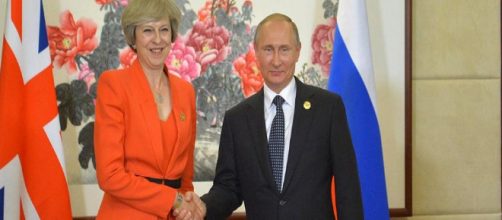Russia have always been a concern for Britain, even at the height of the Empire. It is the reason why Britain sought to break up the Ottoman Empire and install a leader within the region under British protectorate, this led to deals with Sherif Hussein to lead the Arab revolt, the Sykes-Picot agreement, a deal between France and Britain to break up the middle-east and the signing of the Darin Treaty with Ibn Saud, which was the official recognition of his leadership in Arabia leading to the creation Saudi Arabia. Lest not forget the Balfour Declaration that led to the creation of Israel.
The timing of the UK state visit of Saudi’s crown prince, Mohammed bin Salman, is interesting given the history.
Plus, the increase tensions between the West and Russia, particularly since Britain’s closest ally, the US, has charged around a dozen in connection with interference in their 2016 election.
Real life Shogi
In Salisbury, former Russian spy Sergei Skripal and his daughter were poisoned by a nerve agent, with Russia suspicious of conducting an attack on foreign soil because Skripal was convicted of spying for the UK. But with Vladimir Putin seeking re-election in two weeks, tying up loose ends would seem like a plausible tactic, especially if he still had information that could prove detrimental to the elected dictator. Even if it was proved that he did not hold any information negative to Putin, the idea of better safe than sorry (or the Russian equivalent) is probably something Putin follows.
The west has always been wary of Russia and their history violence is something that isn’t hidden, they are almost proud of the hard man image of the Russian military and its leaders. Along with deep levels anti-democratic corruption, Russia have been vying for control over the Middle-East for a century and with recent weakening of the UK and the US, following Brexit and the election of Donald Trump – both of which have been linked to Kremlin involvement in either deepening divisions or direct interference to ensure the preferred outcome comes to fruition – this presents an opportunity for Russia to push forward their military agenda in the region, supporting Turkey and their fascist leader, Recep Tayyip Erdogan.
Furthermore, the secret state of China, whom are close allies with Russia, have been rapidly expanding their naval power to be able to challenge the US in the South China Sea. President Xi Jingping, who is seeking to change the constitution to abolish presidential terms, effectively making himself emperor, has visited Moscow more times than any other state to cement the deep relationship between Beijing and Moscow. Xi has always been against Western powers, in 2013, he circulated a document within the Communist party that spoke of seven dangerous Western values: constitutional democracy, universal values of human rights, civil society, pro-market neo-liberalism, media independence, historical nihilism (criticisms of past errors), and questioning Reform and Opening.
Proxy wars
The Middle-East has been ground for proxy wars between the Western powers and Eastern powers to clash without directly declaring war. Russia have been supporting Assad, Turkey and Qatar along with China using trade and economic growth as means to create allies. This was the reason Saudi Arabia led a boycott against Qatar, after they began conducting international trade in Chinese Yuan rather than US dollar. The UK and US have been supporting, Israel and Saudi Arabia, which has been largely successful in keeping the region under their control for the last century. However, with recent developments at home, the GBP and importantly, USD have been weakening, both have been mainstays in international and European trade for decades.
This has created a mess in the region that has led to the deaths of millions of innocent people, the rise in extremism that has largely been Western funded. Civilians on the ground in Afghanistan have claimed that the US is dropping in military supplies to ISIL – whom they moved into the region - on the border to combat the Russian military presence on the other side in Iran. Russia have always had a powerful ground force, but their naval power has been lacking, something Putin has been fully aware of which explains the deep relationship with China and their move to create a blue water navy. Putin has also been boasting this week of a nuclear missile that can’t be stopped by Western defence systems.
In an interesting development, North Korean leader, Kim Jong-Un, has been vying to cement relationships with South Korea in a rare display of diplomacy and even stated that he would drop their nuclear programme if they were protected. International powers will cast a wary eye over recent developments.

